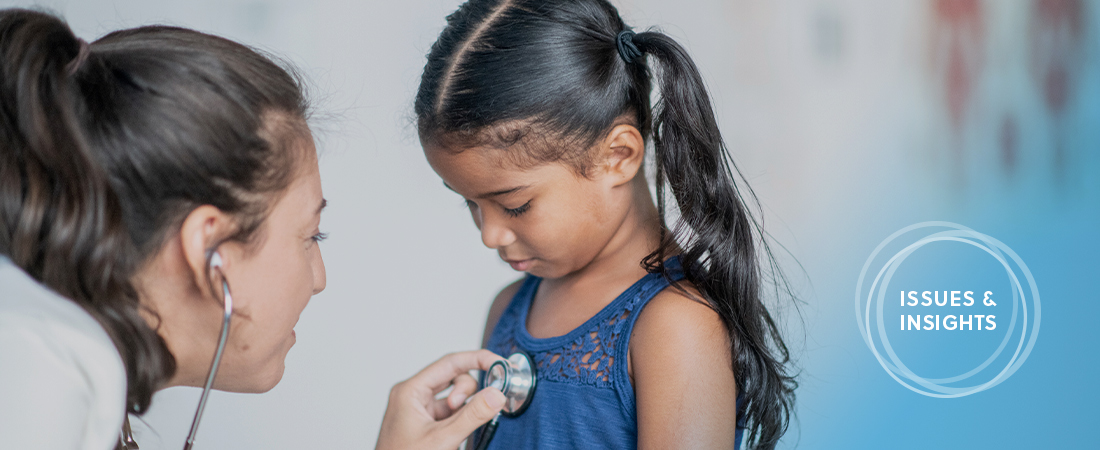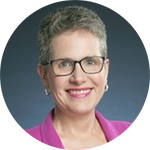The Time Is Now to Improve Children’s Health

For families with young children, routine medical check-ups are an important part of maintaining good health. But over the past year, many families have had to defer these visits due to COVID-19 protocols. This has resulted in missed vaccinations as well as potential delayed diagnoses of physical, behavioral, and developmental concerns.
Dr. Jill Sells knows how valuable those well child visits are: she’s a pediatrician and a mother. At EDC, Sells serves as medical advisor to the National Center on Health, Behavioral Health, and Safety and is leading the National Center’s Expert Workgroup on COVID-19. In this interview, she discusses how the past year has impacted children’s health—and why now is a pivotal time to talk about health equity.
Q. How have the events of the past year revealed some of the fractures that we have in the United States around child health and welfare?
Sells: I think the pandemic has surfaced many things that some of us have known for a long time. One is that families in our country face significant challenges to health and wellness. The United States is way behind most industrialized countries in terms of the supports and services that it offers families. That’s true with regard to quality child care and preschool opportunities, parenting support, and early childhood health and mental health services. We also saw that COVID-19 disproportionately impacted those communities who already encountered the most challenges on a regular basis—people from lower-income households and people of color.
Q. What are some of the specific health outcomes that concern you as the United States emerges from the year-long pandemic?
Sells: We know that a lot of children went without well-child visits this year because families were not able to go to the doctor. This is troublesome, because those visits are so important to the ongoing promotion of healthy development. Many children missed routine vaccinations. Diagnostic screenings were harder to do. This whole year has created a gap in children’s health care, similar to the gap that people are talking about with education.
Q. What advice do you have for pediatricians or health clinics about re-engaging with families now that the pandemic restrictions are being lifted?
Sells: I think one of the most important things is that we all convey the same message, which is that it’s important to go back, and it’s safe to go back. That wherever you get your care—whether it’s with a pediatrician or a family doctor or in a community health center—they’re open for business. And then that message has to be amplified by everyone who works with families. If you are a Head Start provider, if you are a child care provider, if you are a home visitor—it’s important that you are telling families in your orbit that it’s time to re-engage with routine medical care.
Q. Has the pandemic made it easier to talk about fundamental changes that we should be making to the systems that support children’s health?
Sells: I think so. We have always, as a country, made it too hard for families. And if they’re not able to get in for their checkups, for example, that’s generally not the family’s fault. It’s the system’s fault. Our systems are too hard. But I think in this moment, where it’s so obvious that we need to do this better, it’s really on us to commit ourselves within each part of the system to get rid of barriers, and to facilitate things that make it easier for families. And we can learn from the innovations that people came up with all across the country during the pandemic. In a community near me, for example, there was a huge need for diapers. Buying diapers became a really big challenge during the pandemic for a variety of reasons. And community partners just came together and created diaper banks and figured out ways to distribute them to those most in need. So, when push came to shove, people did come together and find creative ways to provide things that families need. Now we have the opportunity to figure out which of those innovations addressed temporary needs, and which should really be implemented for the long term.
Q. You recently co-authored a commentary with Alan Mendelsohn in Pediatrics where you advocate for pediatricians to take a bigger role in supporting child development. Why did you want to call that out?
Sells: It’s actually been true for decades that pediatricians and other child health providers have been involved in promoting child development, but people don’t necessarily know that. And I think that’s because we might not understand how interrelated all these things are. You can’t separate a child’s physical development from their cognitive development, from their social emotional development, from their language and communication. Those things are all developing in a young child from the moment that they’re born. The example we call out in the commentary, “Reach Out and Read,” is a wonderful example of how children’s doctors can take this more active role. “Reach Out and Read” provides brand new children’s books during well-child visits. They are gifts to the families. And that gift can serve as an entry point for the child’s physician to discuss the importance of parents reading with their children. They can model that behavior right there in the doctor’s office. And the reason we want to use those visits is that many families don’t interact with any child-focused professionals outside the health care system in those first few years of life. Studies show that families generally trust their child’s doctor, and inside those regular checkups is our only universal touch point for families up until kindergarten.
Q. You end your commentary by asking, “If we do not act for equity in health and education now, then when?” What did you want to get across by asking that question?
Sells: I think it is way past time to do this. We absolutely know how to act for equity in health and education. What we do not have is systemic funding and structures to enable everyone to do it easily and well. And that is, in my opinion, ridiculous. But now we’ve gone through COVID-19, and we have seen the clear inequities in health and education in this country. So, if we get through this pandemic, and we don’t systematize what we know how to systematize in order to improve health equity, then it means that we don’t really want to address that issue. That would be a huge indictment on all of us. But if we implement systems that support children and families starting from birth, then we will change the trajectory of health and education outcomes for the entire future for our country. It’s no less important than that. And it’s totally possible.
